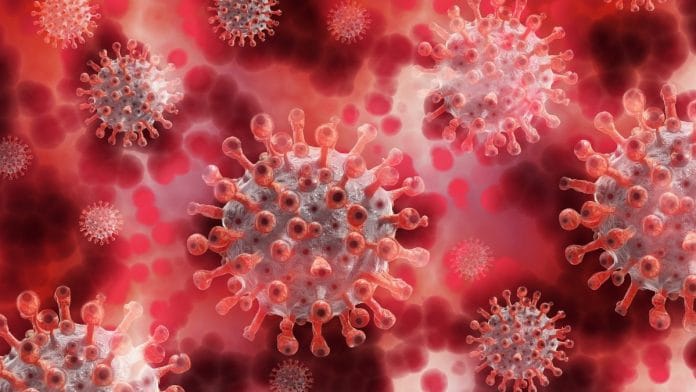New Delhi: As the novel coronavirus continues to infect thousands of people across the world every day, scientists globally are working round-the-clock to understand the virus and to find a potential cure for Covid-19.
Here are some of the latest research studies on SARS-CoV-2
T cells have bigger role in fighting Covid
A type of white blood cell known as T cells take the lead in protecting the body from Covid-19 infection, playing a much bigger role than antibodies, a new study has found.
The findings, published in the journal Cell, suggests that vaccine candidates should aim to elicit a broad immune response that include antibodies as well as T cells to ensure immunity against Covid-19.
The study also points at why older Covid-19 patients are much more vulnerable to the disease. Researchers from La Jolla Institute for Immunology in the US, who did the study, have explained that with increasing age, the reservoir of T cells declines and a body’s immune response becomes less coordinated.
This may explain why older people are more susceptible to severe or fatal Covid-19.
For the study, the researchers collected blood samples from 50 Covid-19 patients and analysed SARS-CoV-2 specific antibodies as well as T cells.
They found that a strong SARS-CoV-2 specific T cell response was predictive of milder infection. The findings indicate that T cells are more important in the body’s fight against Covid-19.
Also read: Study documents 2 cases of reinfections in India, but experts say data doesn’t offer insight
Conditions linked to obesity make people more susceptible
Conditions related to obesity, including inflammation and leaky gut, leave a person’s lungs more susceptible to Covid-19, according to a study which may explain why obese patients are more likely to die from the coronavirus infection.
The study, published in the journal eLife, suggests that drugs used to lower inflammation in the lungs can prove beneficial to obese patients suffering from Covid-19.
While several previous studies have shown correlations between obesity and Covid-19, the mechanism behind why obesity contributes to severe infection was unknown.
One reason behind the increased risk, the new study now suggests, is that fat has high amounts of ACE2 receptors, which are entryways for the SARS-CoV-2 virus on cells. The study, however, notes that conditions linked with obesity are even more powerful contributors to disease severity.
Obesity is accompanied by a higher overall inflammatory state which compromises the response of lung tissues to infection. Another condition that makes obese patients vulnerable to Covid-19 is what is known as ‘leaky gut’ — a condition where cell lining develops gaps, allowing small amounts of intestinal contents to spill into the blood stream.
Covid may become seasonal infection
Even after herd immunity is achieved, Covid-19 is likely to become a seasonal infection in countries with temperate climates, a new study has suggested.
Published in Frontiers in Public Health, the study highlights the importance of public health measures needed to control the virus.
According to researchers of the study, people will need to learn to live with Covid-19 and continue practicing the best prevention measures, including wearing masks, physical distancing, hand hygiene and avoid gatherings.
Many respiratory viruses follow seasonal patterns, such as influenza, and several types of coronaviruses cause common cold. These are known to peak in winter in temperate regions but circulate year-round in tropical areas.
The study shows that any virus’ survival in the air and on surfaces, people’s susceptibility to it and human behaviour, such as indoor crowding, differ during different seasons due to changes in temperature and humidity. These factors influence transmission of respiratory viruses at different times of the year.
However, since the novel coronavirus has a higher rate of transmission, the factors governing seasonality of viruses cannot yet halt its spread in the summer months.
Once herd immunity is achieved, the transmission rate will drop substantially, making the virus more susceptible to seasonal factors, the study said.
Patients with fever, low oxygen likely to need re-hospitalisation
Covid-19 patients who come to the hospital with low oximeter readings or fever are more likely to return within a week of their discharge, a study in the US has found.
Data from the March to May from a region in Philadelphia has showed that roughly 1 in 10 patients diagnosed with Covid-19 needed to return to a hospital after being discharged.
The study, published in Academic Emergency Medicine, provides new insights for clinicians to fight Covid-19.
The study looked at 1,419 patients who went to an emergency department (ED) between 1 March and 28 May, were discharged, and tested positive for Covid-19 within seven days of their visit to the hospital.
Compared to patients in the age group of 18 to 39 years, those over 60 were more than five times as likely to require hospitalisation after being discharged from their initial visit.
The study also found that patients of any age with low pulse oximetry readings were about four times as likely to require hospitalisation upon discharge as compared to those with higher readings. Patients with fever were more than three times as likely to return to a hospital than those without.
Also read: This is why blood from newborn cattle is being used to develop Indian Covid vaccine







One useful article to gain knowledge!
No, it’s wrong statement!…. Because T cells is a trigger factor or catalytic factor for production antibodies… So both are important or you can say that both are connected with each other… .
How to improve T cells quantity in body…
Huh….. Isn’t the T 4 cells the most important in immune response…It is these cell which trigger the production of antibodies…???
how to check out percentage of T cells in self body?
Is it possible by pathology test?
No need to go for it,not required.The best indicator of your immunity is your symptoms and few initial investigations when u acquire it.The best strategy is early test once someone have fever/fatigue/body ache.
Sounds like T virus in Residential Evil movie series.